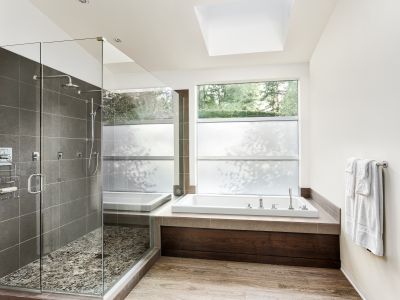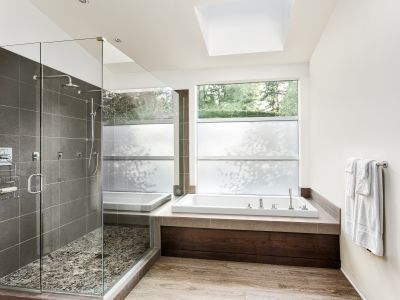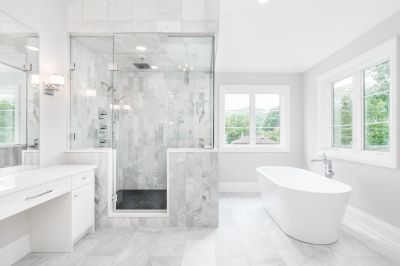Shower Wall Material Options
Welcome to Aberdeen Showers
Shower Wall Material Options

About Shower Wall Material Options
Shop for Shower Wall Material Options
Choosing the right material for shower walls is a crucial decision for homeowners aiming to blend functionality with aesthetic appeal. The shower area is one of the most frequently used spaces in a home, and the materials selected can significantly impact both the visual appeal and the maintenance requirements of the bathroom.
When selecting shower wall materials, it is essential to consider factors such as water resistance, durability, ease of cleaning, and the overall design of the bathroom. Each material comes with its own set of attributes that can enhance or detract from the shower experience. Understanding these attributes can aid in making an informed decision that aligns with personal preferences and practical requirements.
Common materials for shower walls include ceramic tiles, porcelain tiles, natural stone, glass, and acrylic. Each of these materials offers unique benefits and challenges. For instance, ceramic and porcelain tiles are popular for their water resistance and variety of design options, while natural stone provides a luxurious and timeless look.
Homeowners should also consider the finish of the materials. Glossy finishes can make a small bathroom appear larger and are easy to clean, but they might show water spots more readily. Matte finishes offer a more subdued appearance and can hide imperfections better but may require more maintenance.
Dimensions and layout are additional considerations. Large tiles can reduce the number of grout lines and create a seamless look, while smaller tiles can add intricate detail and texture. The choice of layout can also impact the perceived size and style of the bathroom.
- Water Resistance
- Durability
- Ease of Cleaning
- Aesthetic Appeal
- Cost of Installation
| Material | Finish | Dimensions |
|---|---|---|
| Ceramic Tile | Glossy/Matte | Varied |
| Porcelain Tile | Glossy/Matte | Varied |
| Natural Stone | Matte | Custom |
| Glass | Glossy | Custom |
| Acrylic | Glossy | Standard |
Ceramic Tile
Ideal for a classic look, ceramic tiles are available in a variety of colors and patterns, offering great water resistance and durability.
Porcelain Tile
Porcelain tiles are denser and less porous than ceramic, making them a robust option for shower walls, especially in high-moisture areas.
Natural Stone
Offering a luxurious and unique appearance, natural stone requires sealing to maintain its beauty and resist moisture.
Glass
Glass panels provide a sleek, modern look and can make a small bathroom feel more open, though they may require regular cleaning to prevent water spots.
Acrylic
Lightweight and easy to install, acrylic panels are a practical choice for those seeking a low-maintenance option.
Exploring Shower Wall Material Features and Finishes
Shop for Exploring Shower Wall Material Features and Finishes
A Comprehensive Guide to Choosing the Right Shower Wall Material
Choosing the right shower wall material is an essential decision for homeowners looking to enhance their bathroom's aesthetic and functionality. With a variety of materials and finishes available, it's crucial to understand the unique attributes each option offers. From classic tiles to modern acrylic panels, the choice of shower wall material can significantly impact the overall ambiance and maintenance requirements of your bathroom.
Tile remains a popular choice due to its versatility and wide range of design options. Ceramic and porcelain tiles are known for their durability and water resistance, making them ideal for wet environments. These materials come in a vast array of colors, patterns, and textures, allowing homeowners to create a personalized look. However, it's important to consider the upkeep, as grout lines may require regular cleaning to prevent mold and mildew buildup.
Natural stone, such as marble or granite, offers a luxurious and timeless appeal. Each stone is unique in its veining and color variations, providing a distinctive look for your shower. While natural stone is durable, it requires sealing to protect against water damage and stains. The tactile feel and natural beauty of stone can transform a bathroom into a spa-like retreat, but it demands more maintenance compared to synthetic materials.
Acrylic panels are gaining popularity due to their easy installation and minimal maintenance. These panels are available in various colors and finishes, including high-gloss and matte options. Acrylic is lightweight and resistant to chipping and cracking, making it a practical choice for busy households. Its non-porous surface also makes it resistant to mold and mildew, reducing the need for frequent cleaning.
Glass panels offer a sleek and contemporary look, often used to create a sense of openness in smaller bathrooms. Available in clear, frosted, or textured finishes, glass can be customized to match any design preference. While glass is easy to clean and resistant to water damage, it requires regular maintenance to prevent water spots and soap scum buildup. Tempered glass is recommended for safety and durability.
When selecting a shower wall material, consider factors such as durability, aesthetic appeal, and maintenance requirements. It's important to choose a material that complements the overall design of your bathroom while meeting your lifestyle needs. Below is a brief overview of typical attributes associated with popular shower wall materials:
| Material | Finish | Dimensions |
|---|---|---|
| Ceramic Tile | Glossy, Matte | Varied Sizes |
| Natural Stone | Polished, Honed | Custom Cut |
| Acrylic Panel | Glossy, Matte | Standard Panels |
| Glass Panel | Clear, Frosted | Custom Sizes |
Ceramic Tile
Durable and water-resistant, available in various colors and patterns.
Natural Stone
Luxurious appearance with unique veining, requires sealing for protection.
Acrylic Panel
Easy installation and low maintenance, available in different finishes.
Glass Panel
Sleek and modern, available in clear or frosted options, requires regular cleaning.
- Consider the material's resistance to water and stains.
- Evaluate the ease of maintenance and cleaning.
- Match the finish with your bathroom's overall design.
- Assess the installation process and compatibility with existing structures.

Selecting the Ideal Shower Wall Material: Sizing, Compatibility, and Maintenance
Shop for Selecting the Ideal Shower Wall Material
Key Considerations for Choosing the Best Material for Your Shower Walls
Choosing the right material for shower walls is crucial for both functionality and aesthetics. Homeowners have a variety of options, each with unique attributes and maintenance requirements. The selection process involves considering factors such as the material's durability, ease of cleaning, and compatibility with existing bathroom decor.
One popular choice is ceramic tile, known for its versatility in design and color. Ceramic tiles are available in various sizes, allowing for customization to fit any shower space. They are also relatively easy to maintain, requiring regular cleaning to prevent mold and mildew buildup. However, the grout lines can present a challenge in terms of upkeep, as they may require periodic resealing.
Another option is glass, which offers a sleek, modern look. Glass panels are often used in contemporary shower designs and can create an open and airy feel. They are available in clear, frosted, or textured finishes, providing options for privacy and style. Glass is easy to clean but requires regular attention to prevent water spots and soap scum.
For those seeking a natural look, stone materials such as marble or granite can be an excellent choice. These materials bring a luxurious feel to the bathroom, but they do require more maintenance to prevent staining and etching. Stone shower walls should be sealed regularly to maintain their appearance and longevity.
Acrylic and fiberglass are also popular due to their affordability and ease of installation. These materials are lightweight and available in pre-fabricated panels, making them a convenient choice for quick renovations. They are generally low-maintenance, though they can be prone to scratching and may not offer the same aesthetic appeal as more natural materials.
- Durability and resistance to moisture
- Ease of cleaning and maintenance
- Compatibility with existing bathroom decor
- Availability of sizes and finishes
Ceramic Tile
Versatile and available in numerous designs, but grout lines require maintenance.
Glass
Modern and sleek, easy to clean but shows water spots easily.
Stone
Luxurious and natural, requires regular sealing to prevent stains.
Acrylic/Fiberglass
Lightweight and easy to install, though less durable than other materials.
| Material | Finish | Dimensions |
|---|---|---|
| Ceramic Tile | Glossy/Matte | Varies |
| Glass | Clear/Frosted/Textured | Customizable |
| Stone | Polished/Honed | Customizable |
| Acrylic/Fiberglass | Glossy | Standard Sizes |




